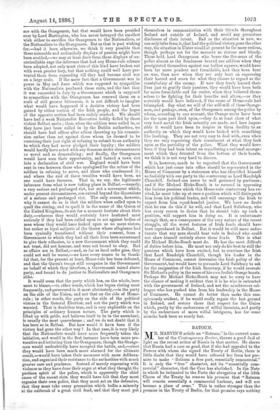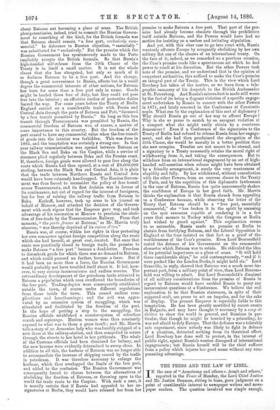B A TOIIIT.
MR. MARVIN'S article on "Batoum," in the current num- ber of the Contemporary Review, throws a good deal of light on the recant action of Russia is that matter. He shows that Russia had a case so good, that if she had appealed to the Powers with whom she signed the Treaty of Berlin, there is little doubt that they would have released her from her pro- mise to make " Batoum a free port, essentially commercial." It is only the " free " character, not its " essentially com- mercial" character, that the Czar has abolishe I. In the Note in which he intimated to the Porte the abrogation of the 59th Clause of the Treaty he renews his promise that " Batoum will remain essentially a commercial harbour, and will not become a place of arms." This is rather stronger than the promise in the Treaty of Berlin, for that promise says nothing about Batoum not becoming a place of arms. The British plenipotentiaries, indeed, tried to commit the Russian Govern- ment to something of the kind, for the British formula was that Batoum should remain "a free port, exclusively com- mercial." In deference to Russian objection, " essentially " was substituted for " exclusively." But the promise which the Russian Government has spontaneously made to the Porte implicitly accepts the British formula. So that Russia's high-handed self-release from the 59th Clause of the Treaty is in itself a small matter. It is not the whole clause that she has abrogated, but only so much of it as declares Batoum to be a free port. And the change, though a great convenience to Russia, affects but in a small degree the commercial interests of other nations, for Batoum has been for some time a free port only in name. Goods might be landed there free of duty, but they could not pass free into the interior ; an effective cordon of protective duties barred the way. For some years before the Treaty of Berlin England carried on a considerable trade with Persia and Central Asia through the ports of Batoum and Poti, "favoured by a free transit permitted by Russia." So long as this free transit through Transcaucasia was permitted by Russia, the commercial freedom of Batoum was, of course, a matter of some importance to this country. But the freedom of the port ceased to have any commercial value when the free transit of goods into the interior was forbidden. This was done in 1883. and the temptation was certainly a strong one. In that year railway communication was opened between Batoum on the Black Sea and Baku on the Caspian, while a service of steamers plied regularly between Baku and the Persian coast, If, therefore, foreign goods were allowed to pass free along the route which Russia had thus opened, at a cost of £8,000,000 sterling, between the Black Sea and Central Asia, it is plain that the trade between Northern Russia and Central Asia would have been ruinously handicapped. The Russian Govern- ment was thus forced to reconsider the policy of free transit across Transcaucasia, and its first decision was in favour of its continuance, not out of regard for the interest of foreigners, but for fear of ruining the railway traffic from Batoum to Baku. Katkoff, however, took up arms in his journal on behalf of Moscow, and attacked the decision of the Govern- ment with such vigour that the Emperor gave way, and took advantage of his coronation at Moscow to proclaim the aboli- tion of free-trade by the Transcaucasian Railway. From that moment, " the porto franc° at Batoum," as Mr. Marvin truly observes, " was thereby deprived of its raison d'etre."
Russia was, of course, within her rights in thus protecting her own commerce against foreign competition along the route which she had herself, at great coat, created. But once that route was practically closed to foreign trade, the promise to make Batoum " a free port" became a dead-letter. Freedom to disembark goods for which there was no demand in Batoum, and which could proceed no further, became a farce. But if it had been no more than a farce, the Russian Government would probably not have troubled itself about it. It led, how- ever, to very serious inconvenience and endless worries. The extraordinary development of the petroleum trade attracted to Batoum a population which soon overflowed the boundaries of the free port. Trading-depots were consequently established outside the town, of course under different regulations from those inside the town. This caused endless com- plications and heartburnings ; and the evil was aggra- vated by an extensive system of smuggling, which was stimulated and facilitated by the freedom of the port. In the hope of putting a stop to the smuggling, the Russian officials established a counter-system of relentless search and espionage. Moslem women were thus constantly exposed to what was to them a gross insult ; and Mr. Marvin tells a story of an Armenian lady who was forcibly stripped of a new dress at the railway-station, and then compelled to return through the streets to her hotel in her petticoats. The whole of the Customs officials had been dismissed for bribery, and the new brooms were evidently determined to sweep clean. In addition to all this, the harbour of Batoum was no longer able to accommodate the increase of shipping caused by the traffic in petroleum. It was therefore necessary to enlarge the harbour, which thus overlapped the limits of the free port, and added to the confusion. The Russian Government was consequently forced to choose between the alternatives of abolishing the freedom of Batoum, or throwing open to the world the trade route to the Caspian. With such a case, it is morally certain that if Russia had appealed to her co- signatories at Berlin, they would have released her from her promise to make Batoum a free port. That part of the pro- mise had already become obsolete through the prohibitive tariff outside Batoum, and the Powers would have had no motive for insisting on a useless and irritating stipulation.
And yet, with this clear case to go into court with, Russia wantonly affronts Europe by arrogantly abolishing by her own solitary fiat one of the clauses of an international treaty. On the face of it, indeed, as we remarked on a previous occasion, the Czar's promise reads like a spontaneous act which he had power to recall at his discretion. But the other Powers took note of the promise, and we understand that in the opinion of competent authorities, this sufficed to make the Czar's promise an integral part of the Treaty. This is the view which Lord Rosebery has taken of the matter, as we learn from a tele- graphic summary of his despatch to the British Ambassador at St. Petersburg. And Russia's misconduct is made still worse by the fact of its being a flagrant violation of a specific engage- ment undertaken by Russia in concert with the other Powers in 1871, and lately renewed in the Conference at Constanti- nople. What can be the explanation of this sort of diplomacy ? Why should Russia go out of her way to affront Europe ? Why is she so prone to snatch by an arrogant violation of a compact what she might easily obtain by a courteous demeanour? Even if a Conference of the signatories to the Treaty of Berlin had refused to release Russia from her engage- ment, and she had then proclaimed the abrogation of the 59th Clause, she would be morally in a better position than she now occupies. Treaties are not meant to be eternal, and a signatory to a Treaty necessarily retains the moral right of withdrawing from it, and taking the consequences. But to withdraw from an international engagement by an act of high- handed self-assertion when release might have been obtained by a friendly arrangement, is surely the very wantonness of stupidity and folly. By her withdrawal, without consultation with the other Powers, from an onerous clause in the Treaty of Paris, and by the repetition of this diplomatic lawlessness in the case of Batoum, Russia has quite unnecessarily shaken the confidence of Europe in her good faith. Mr. Marvin thinks the explanation is that Russia shrank from appealing to a Conference because, while observing the letter of the Treaty that Batoum should be a " free port, essentially commercial," she " has broken it in the spirit by amassing on the spot resources capable of rendering it in a few years that menace to Turkey which the Congress at Berlin had wished to guard against." This explanation seems to us untenable. Russia made no promise at Berlin to abstain from fortifying Batoum, and the Liberal Opposition in England at the time insisted on that fact as a proof of the worthlessness of the Czar's promise. Even Lord Beaconsfield rested the defence of his Government on the commercial character which Batoum was to retain. He ridiculed the idea of its potential importance as a place of arms. " It will hold three considerable ships," he said contemptuously, " and if it were packed like the London Docks, it might hold six." Lord Granville, in reply, showed that Batoum was a much more im- portant port, from a military point of view, than Lord Beacons- field was willing to admit. But Lord Beaconsfield's dismissal of all military considerations from the promise of Russia in regard to Batoum would have enabled Russia to parry any inconvenient questions at a Conference. We believe the real explanation to be that Russian statesmen, in spite of their supposed craft, are prone to act on impulse, and for the sake of display. The present Emperor is especially liable to this temptation. He has been greatly mortified by recent events in Bulgaria, and may have thought it necessary by a coup de theiltre to show the world in general, and Russians in par- ticular, that though he might be bearded by a princeling, he was not afraid to defy Europe. That the defiance was a tolerably safe experiment, since nobody was likely to fight in defence of a phantom, detracted nothing from its theatrical effect. Lord Rosebery has done well fo protest, in the interest of public right, against Russia's wanton disregard of international engagements ; but Russia herself will be the chief sufferer from a policy which injures her good name without any com- pensating advantage.



































 Previous page
Previous page